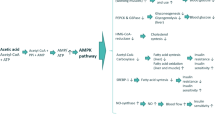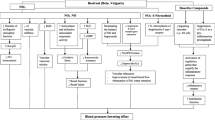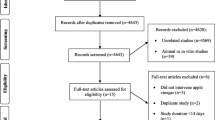Abstract
There is a growing body of evidence that tomato consumption reduces the risk of cardiovascular disease, through antioxidative, anti-inflammatory and hypotensive effects. We compared the effects of polyphenol-enriched and standard tomato juice on parameters of lipid and oxidative status and blood pressure in subjects with stage 1 hypertension. The experimental group (n = 13) was supplemented with 200 g of tomato fruit juice enriched with 1 g of ethanolic extract of whole tomato fruit, while the control group (n = 13) was consuming 200 g tomato fruit juice. Before and after the treatment, blood samples were collected, and blood pressure was measured. Markers of oxidative stress and antioxidative defense: paraoxonase (PON1), thiobarbituric acid reactive substances (TBARS), total antioxidant status (TAS), total oxidant status (TOS), pro-oxidant-antioxidant balance (PAB) and C reactive protein (CRP) were determined in serum. Prothrombin time (PT) was measured in the whole blood samples. Parameters of lipid status, as well as susceptibility to copper-induced oxidation of LDL particles in vitro were also determined. There was a significant reduction in total cholesterol and LDL-C only in the control group at the end of the study. No significant differences were observed in the remainder of the assessed parameters along the study. In conclusion, tomato juice may have favorable effects on lipid metabolism, but polyphenol fortification does not constitute additional beneficial cardiovascular effects.
Similar content being viewed by others
Abbreviations
- ANCOVA:
-
Analysis of covariance
- CRP:
-
C-reactive protein
- CVD:
-
Cardiovascular diseases
- DBP:
-
Diastolic blood pressure
- GAE:
-
Gallic acid equivalents
- HDL-C:
-
High-density- cholesterol
- INR:
-
International normalized ratio
- LDL-C:
-
Low-density cholesterol
- PAB:
-
Pro-oxidant-antioxidant balance
- PON1:
-
Paraoxonase
- PT:
-
Prothrombin time
- SBP:
-
Systolic blood pressure
- TAS:
-
Total antioxidant status
- TBARS:
-
Thiobarbituric acid reactive substances
- TC:
-
Total cholesterol
- TGC:
-
Triglycerides
- TOS:
-
Total oxidant status
References
Alissa EM, Ferns GA (2017) Dietary fruits and vegetables and cardiovascular diseases risk. Crit Rev Food Sci Nutr 57(9):1950–1962. https://doi.org/10.1080/10408398.2015.1040487
Szabo K, Catoi AF, Vodnar DC (2018) Bioactive compounds extracted from tomato processing by-products as a source of valuable nutrients. Plant Foods Hum Nutr 73(4):268–277. https://doi.org/10.1007/s11130-018-0691-0
Burton-Freeman B, Sesso HD (2014) Whole food versus supplement: comparing the clinical evidence of tomato intake and lycopene supplementation on cardiovascular risk factors. Adv Nutr 5(5):457–485. https://doi.org/10.3945/an.114.005231
Britton G (1995) Structure and properties of carotenoids in relation to function. FASEB J 9(15):1551–1558. https://doi.org/10.1096/fasebj.9.15.8529834
Raiola A, Rigano MM, Calafiore R, Frusciante L, Barone A (2014) Enhancing the health-promoting effects of tomato fruit for biofortified food. Mediat Inflamm 2014:139873. https://doi.org/10.1155/2014/139873
Yao LH, Jiang YM, Shi J, Tomas-Barberan FA, Datta N, Singanusong R, Chen SS (2004) Flavonoids in food and their health benefits. Plant Foods Hum Nutr 59(3):113–122. https://doi.org/10.1007/s11130-004-0049-7
Cheng HM, Koutsidis G, Lodge JK, Ashor A, Siervo M, Lara J (2017) Tomato and lycopene supplementation and cardiovascular risk factors: a systematic review and meta-analysis. Atherosclerosis 257:100–108. https://doi.org/10.1016/j.atherosclerosis.2017.01.009
Shidfar F, Froghifar N, Vafa M, Rajab A, Hosseini S, Shidfar S, Gohari M (2011) The effects of tomato consumption on serum glucose, apolipoprotein B, apolipoprotein A-I, homocysteine and blood pressure in type 2 diabetic patients. Int J Food Sci Nutr 62(3):289–294. https://doi.org/10.3109/09637486.2010.529072
Thies F, Masson LF, Rudd A, Vaughan N, Tsang C, Brittenden J, Simpson WG, Duthie S, Horgan GW, Duthie G (2012) Effect of a tomato-rich diet on markers of cardiovascular disease risk in moderately overweight, disease-free, middle-aged adults: a randomized controlled trial. Am J Clin Nutr 95(5):1013–1022. https://doi.org/10.3945/ajcn.111.026286
Upritchard JE, Sutherland WH, Mann JI (2000) Effect of supplementation with tomato juice, vitamin E, and vitamin C on LDL oxidation and products of inflammatory activity in type 2 diabetes. Diabetes Care 23(6):733–738. https://doi.org/10.2337/diacare.23.6.733
Palozza P, Catalano A, Simone RE, Mele MC, Cittadini A (2012) Effect of lycopene and tomato products on cholesterol metabolism. Ann Nutr Metab 61(2):126–134. https://doi.org/10.1159/000342077
Manach C, Williamson G, Morand C, Scalbert A, Remesy C (2005) Bioavailability and bioefficacy of polyphenols in humans. I. Review of 97 bioavailability studies. Am J Clin Nutr 81(1 Suppl):230S–242S. https://doi.org/10.1093/ajcn/81.1.230S
Markovits N, Ben Amotz A, Levy Y (2009) The effect of tomato-derived lycopene on low carotenoids and enhanced systemic inflammation and oxidation in severe obesity. Isr Med Assoc J 11(10):598–601
Bose KS, Agrawal BK (2006) Effect of long term supplementation of tomatoes (cooked) on levels of antioxidant enzymes, lipid peroxidation rate, lipid profile and glycated haemoglobin in type 2 diabetes mellitus. West Indian Med J 55(4):274–278. https://doi.org/10.1590/S0043-31442006000400010
Bose KS, Agrawal BK (2007) Effect of lycopene from tomatoes (cooked) on plasma antioxidant enzymes, lipid peroxidation rate and lipid profile in grade-I hypertension. Ann Nutr Metab 51(5):477–481. https://doi.org/10.1159/000111170
Bub A, Barth SW, Watzl B, Briviba K, Rechkemmer G (2005) Paraoxonase 1 Q192R (PON1-192) polymorphism is associated with reduced lipid peroxidation in healthy young men on a low-carotenoid diet supplemented with tomato juice. Br J Nutr 93(3):291–297. https://doi.org/10.1079/BJN20041309
Belović MM, Gironés-Vilaplana A, Moreno DA, Milovanović IL, Novaković AR, Karaman MA, Ilić NM (2016) Tomato (Solanum lycopersicum L.) processing main product (juice) and by-product (pomace) bioactivity potential measured as antioxidant activity and angiotensin-converting enzyme inhibition. J Food Process Preserv 40(6):1229–1237. https://doi.org/10.1111/jfpp.12707
Briviba K, Schnabele K, Rechkemmer G, Bub A (2004) Supplementation of a diet low in carotenoids with tomato or carrot juice does not affect lipid peroxidation in plasma and feces of healthy men. J Nutr 134(5):1081–1083. https://doi.org/10.1093/jn/134.5.1081
Engelhard YN, Gazer B, Paran E (2006) Natural antioxidants from tomato extract reduce blood pressure in patients with grade-1 hypertension: a double-blind, placebo-controlled pilot study. Am Heart J 151(1):100. https://doi.org/10.1016/j.ahj.2005.05.008
Michalickova D, Kotur-Stevuljevic J, Miljkovic M, Dikic N, Kostic-Vucicevic M, Andjelkovic M, Koricanac V, Djordjevic B (2018) Effects of probiotic supplementation on selected parameters of blood prooxidant-antioxidant balance in elite athletes: a double-blind randomized placebo-controlled study. J Hum Kinet 64(1):111–122. https://doi.org/10.1515/hukin-2017-0203
Burton-Freeman B, Talbot J, Park E, Krishnankutty S, Edirisinghe I (2012) Protective activity of processed tomato products on postprandial oxidation and inflammation: a clinical trial in healthy weight men and women. Mol Nutr Food Res 56(4):622–631. https://doi.org/10.1002/mnfr.201100649
Martinez-Huelamo M, Vallverdu-Queralt A, Di Lecce G, Valderas-Martinez P, Tulipani S, Jauregui O, Escribano-Ferrer E, Estruch R, Illan M, Lamuela-Raventos RM (2016) Bioavailability of tomato polyphenols is enhanced by processing and fat addition: evidence from a randomized feeding trial. Mol Nutr Food Res 60(7):1578–1589. https://doi.org/10.1002/mnfr.201500820
Valderas-Martinez P, Chiva-Blanch G, Casas R, Arranz S, Martinez-Huelamo M, Urpi-Sarda M, Torrado X, Corella D, Lamuela-Raventos RM, Estruch R (2016) Tomato sauce enriched with olive oil exerts greater effects on cardiovascular disease risk factors than raw tomato and tomato sauce: a randomized trial. Nutrients 8(3):170. https://doi.org/10.3390/nu8030170
Tuck KL, Freeman MP, Hayball PJ, Stretch GL, Stupans I (2001) The in vivo fate of hydroxytyrosol and tyrosol, antioxidant phenolic constituents of olive oil, after intravenous and oral dosing of labeled compounds to rats. J Nutr 131(7):1993–1996. https://doi.org/10.1093/jn/131.7.1993
Acknowledgments
This work is supported by the Ministry of Education, Science and Technological Development of the Republic of Serbia (Project No. III 46001 and 175035) and the Charles University Project Progress Q25.
Author information
Authors and Affiliations
Corresponding author
Ethics declarations
Conflict of Interest
The present study does not constitute endorsement of the product by the authors or any conflict of interest.
Additional information
Publisher’s Note
Springer Nature remains neutral with regard to jurisdictional claims in published maps and institutional affiliations.
Rights and permissions
About this article
Cite this article
Michaličková, D., Belović, M., Ilić, N. et al. Comparison of Polyphenol-Enriched Tomato Juice and Standard Tomato Juice for Cardiovascular Benefits in Subjects with Stage 1 Hypertension: a Randomized Controlled Study. Plant Foods Hum Nutr 74, 122–127 (2019). https://doi.org/10.1007/s11130-019-0714-5
Published:
Issue Date:
DOI: https://doi.org/10.1007/s11130-019-0714-5




